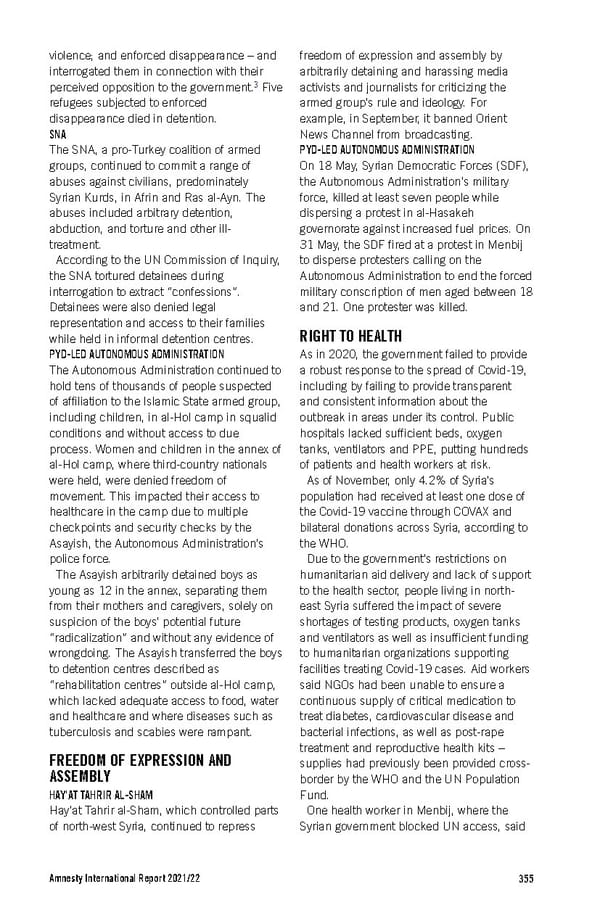violence; and enforced disappearance – and freedom of expression and assembly by interrogated them in connection with their arbitrarily detaining and harassing media 3 perceived opposition to the government. Five activists and journalists for criticizing the refugees subjected to enforced armed group’s rule and ideology. For disappearance died in detention. example, in September, it banned Orient SNA News Channel from broadcasting. The SNA, a pro-Turkey coalition of armed PYD-LED AUTONOMOUS ADMINISTRATION groups, continued to commit a range of On 18 May, Syrian Democratic Forces (SDF), abuses against civilians, predominately the Autonomous Administration’s military Syrian Kurds, in Afrin and Ras al-Ayn. The force, killed at least seven people while abuses included arbitrary detention, dispersing a protest in al-Hasakeh abduction, and torture and other ill- governorate against increased fuel prices. On treatment. 31 May, the SDF fired at a protest in Menbij According to the UN Commission of Inquiry, to disperse protesters calling on the the SNA tortured detainees during Autonomous Administration to end the forced interrogation to extract “confessions”. military conscription of men aged between 18 Detainees were also denied legal and 21. One protester was killed. representation and access to their families RIGHT TO HEALTH while held in informal detention centres. PYD-LED AUTONOMOUS ADMINISTRATION As in 2020, the government failed to provide The Autonomous Administration continued to a robust response to the spread of Covid-19, hold tens of thousands of people suspected including by failing to provide transparent of affiliation to the Islamic State armed group, and consistent information about the including children, in al-Hol camp in squalid outbreak in areas under its control. Public conditions and without access to due hospitals lacked sufficient beds, oxygen process. Women and children in the annex of tanks, ventilators and PPE, putting hundreds al-Hol camp, where third-country nationals of patients and health workers at risk. were held, were denied freedom of As of November, only 4.2% of Syria’s movement. This impacted their access to population had received at least one dose of healthcare in the camp due to multiple the Covid-19 vaccine through COVAX and checkpoints and security checks by the bilateral donations across Syria, according to Asayish, the Autonomous Administration’s the WHO. police force. Due to the government’s restrictions on The Asayish arbitrarily detained boys as humanitarian aid delivery and lack of support young as 12 in the annex, separating them to the health sector, people living in north- from their mothers and caregivers, solely on east Syria suffered the impact of severe suspicion of the boys’ potential future shortages of testing products, oxygen tanks “radicalization” and without any evidence of and ventilators as well as insufficient funding wrongdoing. The Asayish transferred the boys to humanitarian organizations supporting to detention centres described as facilities treating Covid-19 cases. Aid workers “rehabilitation centres” outside al-Hol camp, said NGOs had been unable to ensure a which lacked adequate access to food, water continuous supply of critical medication to and healthcare and where diseases such as treat diabetes, cardiovascular disease and tuberculosis and scabies were rampant. bacterial infections, as well as post-rape FREEDOM OF EXPRESSION AND treatment and reproductive health kits – ASSEMBLY supplies had previously been provided cross- border by the WHO and the UN Population HAY’AT TAHRIR AL-SHAM Fund. Hay’at Tahrir al-Sham, which controlled parts One health worker in Menbij, where the of north-west Syria, continued to repress Syrian government blocked UN access, said Amnesty International Report 2021/22 355
 Amnesty International Report 2021/22 Page 354 Page 356
Amnesty International Report 2021/22 Page 354 Page 356